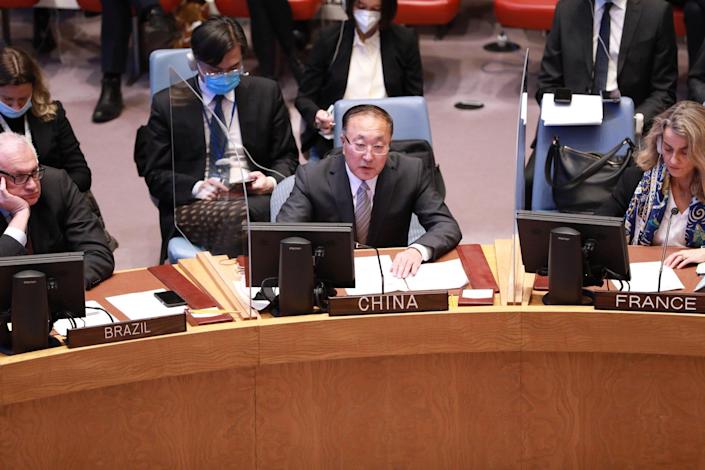A top US State Department official gave new hints on Wednesday of the consequences China might face if it gets caught aiding Russia in the invasion of Ukraine – the latest sign that Beijing has failed to convince Washington of its proclaimed neutrality in the war.
“I think one only has to look at the range of sanctions, more to be announced today, against [Russian President Vladimir] Putin,” Deputy Secretary of State Wendy Sherman, the department’s No 2 official, told the House Foreign Affairs Committee.
“It gives President Xi [Jinping], I think, a pretty good understanding of what might come his way should he in fact support Putin in any material fashion.”
Do you have questions about the biggest topics and trends from around the world? Get the answers with SCMP Knowledge, our new platform of curated content with explainers, FAQs, analyses and infographics brought to you by our award-winning team.
US President Joe Biden’s administration has repeatedly warned China about the potential economic fallout should it helps Russia in the war, whether financially or militarily.
Numerous reports, citing US officials, have said that Beijing has considered providing that help.
But Washington has been mostly silent on the details of what those consequences might look like.
On Wednesday, Sherman sketched in some possibilities. She referred to sanctions against Russia’s economy – “against individuals who are enablers, against elites, against oligarchs, export controls, designations” – and emphasised that they had come not only from the US, “but in unprecedented fashion, coordinated with our allies and partners, not just in New York, but throughout the world.”
“We hope … the PRC gets some lessons learned out of this,” she said. “I hope there’s some lessons learned that sanctions bite, that we will keep them coming, that there will be consequences for actions.”
Throughout the war, China has struggled to portray itself to a Western audience as neutral, despite years of proclaiming the sanctity of national sovereignty as a core tenet of its own foreign policy.
First Chinese officials played down the threat of an imminent invasion before it began on February 24, then they refused to condemn Russia’s military action – or describe it as an invasion at all.


China’s ambassador to the United Nations Zhang Jun speaking during a Security Council briefing on Ukraine on Tuesday. China has refused to condemn Russia for its military action, or even call it an invasion. Photo: Xinhua alt=China’s ambassador to the United Nations Zhang Jun speaking during a Security Council briefing on Ukraine on Tuesday. China has refused to condemn Russia for its military action, or even call it an invasion. Photo: Xinhua>
Beijing has promoted Kremlin disinformation about the war – including the notion that Russia’s objective was the “denazification” of Ukraine – while emphasising repeatedly that the Sino-Russian relationship has “no limits”.
The Biden administration has debated internally just how hard to press China over its partnership with Russia.
At times on Wednesday, Sherman seemed to embody that debate – issuing warnings to Beijing, then insisting that China must have been horrified by, for example, Russia’s violence against civilians, which President Biden has called war crimes.


Police officers collecting information about corpses of civilians killed in Bucha, Ukraine, on Wednesday, before the bodies are transported to the morgue. Photo: AP alt=Police officers collecting information about corpses of civilians killed in Bucha, Ukraine, on Wednesday, before the bodies are transported to the morgue. Photo: AP>
“I think we’ve all seen indications that they are conflicted somewhat,” Sherman said, referring to Beijing. “That’s not to say they don’t see Russia as a partner. I’m not naive. They do.”
“But they’ve also been public to say it is not an alliance,” she said. “And they certainly, I think even in the meeting the other day, were horrified by what happened in Bucha,” the site of a massacre of civilians.
“Who could not have been by seeing that video?” she said. “I think this is an ongoing circumstance and relationship, and we’re going to have to keep working at it.”
Additional reporting by Owen Churchill
This article originally appeared in the South China Morning Post (SCMP), the most authoritative voice reporting on China and Asia for more than a century. For more SCMP stories, please explore the SCMP app or visit the SCMP’s Facebook and Twitter pages. Copyright © 2022 South China Morning Post Publishers Ltd. All rights reserved.
Copyright (c) 2022. South China Morning Post Publishers Ltd. All rights reserved.




